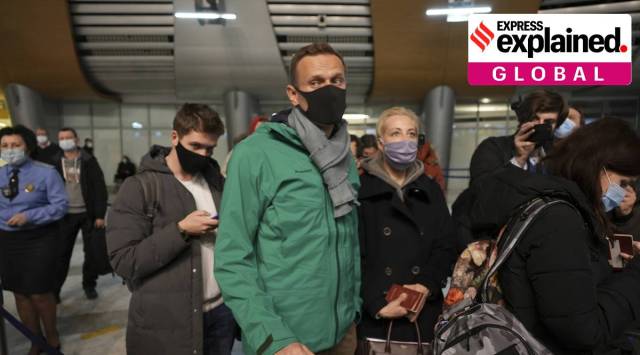- India
- International
Explained: Why has Russia detained opposition leader Alexei Navalny?
Following this, the US and European countries have demanded that Navalny be released from detention.
 Alexei Navalny and his wife Yuliastand in line at the passport control after arriving at Sheremetyevo airport, outside Moscow, Russia, Sunday, Jan. 17, 2021. (AP Photo/Mstyslav Chernov)
Alexei Navalny and his wife Yuliastand in line at the passport control after arriving at Sheremetyevo airport, outside Moscow, Russia, Sunday, Jan. 17, 2021. (AP Photo/Mstyslav Chernov)Russian authorities detained opposition leader Alexei Navalny at a Moscow airport on Sunday after he returned from Germany for the first time since his poisoning in August last year. Following this, the US and European countries have demanded that Navalny be released from detention.
On August 20 last year, Navalny fell ill on a flight back to Moscow from Siberia. After the plane made an emergency landing, he was first taken to a hospital in the city of Omsk, from where he was later transferred to Berlin’s Charite Hospital while still in a coma. Tests performed at the German hospital showed the presence of the Soviet-era nerve agent Novichok.
Navalny has maintained that the poisoning was carried out by the Russian authorities, who have denied any involvement in the attack.
Who is Alexei Navalny?
Navalny, a lawyer-turned-activist, came to prominence in 2008 after he started exposing corruption in Russian politics through a blog. In 2018, he was barred from standing against Putin in the presidential elections.
He has also been arrested on multiple occasions and since he started political campaigning, Navalny has spearheaded many anti-corruption rallies in Russia and is considered to be the face of the opposition in Russia, a country that has long been known to eliminate dissidents and spies by poisoning them.

 A view shows a police station where detained Russian opposition leader Alexei Navalny is being held, in Khimki outside Moscow, Russia January 18, 2021. (Reuters Photo)
A view shows a police station where detained Russian opposition leader Alexei Navalny is being held, in Khimki outside Moscow, Russia January 18, 2021. (Reuters Photo)
What happened to him?
In August, Kremlin critic Navalny was put on ventilator support in a Siberian hospital after he consumed a cup of tea that is suspected to be poisoned.
Navalny’s spokesperson Kira Yarmysh said on Twitter that while Navalny was returning to Moscow by air, he felt unwell as a result of which the plane made an emergency landing in Omsk. She added that Navalny has toxic poisoning. According to a report by Bellingcat and The Insider, Russian intelligence operatives trained in poisons, who had been trailing Navalny for years, were nearby him around this time.
“We assume that Alexei was poisoned with something mixed into the tea. It was the only thing that he drank in the morning. Doctors say the toxin was absorbed faster through the hot liquid. Alexey is now unconscious,” Yarmysh wrote on the social media platform in August.
But this was not the first time that Navalny was faced with such a situation. Last year, Navalny was hospitalised after he suffered an allergic reaction in jail, possibly from an unknown chemical substance. Two years before this, Navalny was doused with a bright green liquid in the Siberian city of Barnaul by an assailant who pretended to shake his hand.
Last month, Navalny said that he had tricked a Russian intelligence operative into confessing to the botched attempt to kill him in August and divulging that the poison meant to do the job was placed on the inside of Navalny’s underwear.
In a YouTube video titled “I called my killer. He confessed”, Navalny is seen speaking over the phone at length with the intelligence officer, who Navalny and the investigative research group Bellingcat have said is a chemical weapons specialist with Russia’s Federal Security Service (FSB).
In the video, Navalny is seen speaking in a no-nonsense tone, and tells the man on the other side of the phone that he was preparing an urgent report about “what went wrong” with the alleged poisoning plot, and why Navalny survived.
A few minutes into the call, the man alleged to be Konstantin Kudryavtsev confessed that the motive of the mission was to kill Navalny, and that the dissident could survive the attempt thanks to the emergency landing that the pilot made at Omsk, and because of the “prompt work of the ambulance medics on the runway”.
What has been Russia’s reaction?
Russian authorities have denied playing a role in Navalny’s poisoning.
As per a TASS news agency report, the FSB has called the video clip “fake”, and said that Navalny’s investigation was a “planned provocation aimed at discrediting the FSB which could not have been carried out without the organizational and technical support of international intelligence agencies.”
Last month, Russian president Vladimir Putin alleged that Navalny “relies on the support of US special services.” He said, “It’s curious, and in that case, special services indeed need to keep an eye on him. But that doesn’t mean that there is a need to poison him. Who would need that?”
The Russian leader, who is entering his 22nd year in power, has even told journalists with a laugh that if Russian operatives wanted to kill Navalny, “they would have probably finished the job.”
In an opinion article in the New York Times in August last year, Russian journalist Oleg Kashin wrote, “If the Russian government has now decided to get rid of Mr. Navalny, that suggests it is constructing some new political configuration in which there is no longer a need for any kind of an opposition.”
“…Navalny has truly held an important place in the political system for many years with his unique monopoly over the segment of the opposition that refuses to compromise with the Kremlin,” he added.
Other alleged poisonings by Russia
Sergei Skripal: On March 4, 2018, former Russian spy Skripal and his daughter Yulia Skripal were found unconscious on a bench in the British city Salisbury after they were poisoned by a military-grade nerve agent Novichok. Both of them have since recovered, including police officer Nick Bailey, one of the first responders who fell seriously ill after being exposed to the nerve agent.
The only person who died from the exposure was a 44-year-old woman who died a few months later when she came into contact with the nerve agent. The woman was exposed to it after she came in contact with a counterfeit perfume bottle that had been discarded in Salisbury.
In 2006, Skripal was sentenced to 13 years in prison after he was accused of spying for Britain. At the time, Russia claimed that Britain’s intelligence service MI6 had paid him $100,000 for revealing the identities of Russian secret agents in Europe. After his conviction, Skripal was pardoned in 2010 by then Russian president Dmitry Medvedev.
After the poisoning, all Russian intelligence officers working under diplomatic cover in the UK and many other countries were expelled. The US expelled over 60 such officers. The investigation led by the UK government later revealed that the poisonings were an assassination attempt carried out by agents of the Russian intelligence service called the GRU.
Skripals’ poisonings are also the subject of the BBC One drama titled, “The Salisbury Poisonings”. According to some news reports, Skripal and his daughter are now staying in New Zealand under new identities.
Pyotr Verzilov: A few months after Skripal, an anti-Kremlin activist and Putin critic who is a member of the Russian protest group called Pussy Riot was taken ill after a poisoning attempt that Verzilov alleged was carried out by Russian intelligence services. After he fell ill in September 2018, he was evacuated to Berlin from Moscow where doctors confirmed that his symptoms were consistent with poisoning.
He told the BBC in 2018 that the reasons why they might have tried to poison him could be his participation in a pitch invasion during the 2018 FIFA World Cup final, after which Verzilov and three other members of Pussy Riot were jailed briefly. The other reason cited by Verzilov was for investigating the case of three Russian journalists who were “murdered” in the Central African Republic (CAR).
Vladimir Kara-Murza: In 2017, Putin critic and journalist Kara-Murza fell into a coma after a suspected poisoning attempt. In 2015, Kara-murza nearly died and suffered sudden kidney failure after another alleged poisoning attempt. According to a report in The New York Times, after the 2015 attempt, a French lab found elevated levels of heavy metals in his blood. Kara-Murza has recovered since then and resides in Moscow.
Alexander Litvinenko: Former spy Litvinenko, who was being paid by the MI6 and was investigating Spanish links to Russia, was killed in November 2006 after he ingested a fatal dose of polonium 210 while drinking tea at Millenium Hotel in London. At the time he was meeting with Russian politician Andrei Lugovoy and his associate Dmitri Kovtun. Lugovoy is considered to be one of the main suspects.
Litvinenko did not survive, while Russia continues to deny any involvement in the incident. Litvinenko was an officer in the FSB, the successor of the KGB and was dismissed in 1998 after he made public allegations of illegal activity within the FSB. He left Russia in 2000 and in 2001 was given asylum in Britain.
An inquiry report into his death released in 2016 by the British inquiry concluded, “Taking full account of all the evidence and analysis available to me, I find that the FSB operation to kill Mr. Litvinenko was probably approved by Mr. Patrushev and also by President Putin.”
Viktor Yushchenko: In 2004, Yushchenko was poisoned in the midst of an election campaign, in which he was expected to defeat the Russia-backed candidate. Yushchenko ingested dioxin, a chemical found in Agent Orange while he was eating dinner with the head of Ukraine’s security service.
The poisoning severely disfigured his face and his test results showed that he suffered from chloracne, which is caused by exposure to toxic chemicals. Yushchenko eventually recovered and went on to win the presidential elections that year. He accused the Ukrainian authorities of trying to poison him.
Russia has long been known to use poison as a way of eliminating political dissidents and spies. An article published by the Atlantic Council, a think tank, says many victims of Putin’s assassins, “serve as useful symbols of what happens to anyone accused of betraying or otherwise cheating the Kremlin.” Significantly, not all assassination attempts have been successful recently, suggesting declining professionalism, “as Russia seeks to deploy greater numbers of assassins abroad.”
Add to this that since the Cold War, the Soviet Union heavily invested in the development of poisons as a way of targetting enemies, an article in Foreign Policy says. In 1921, Laboratory 12 was established on the outskirts of Moscow and researched poisons, drugs and psychotropic substances, thereby giving the Kremlin an array of tools to choose from.
More Explained
EXPRESS OPINION
Apr 18: Latest News
- 01
- 02
- 03
- 04
- 05








































